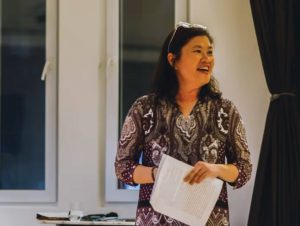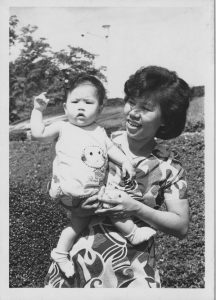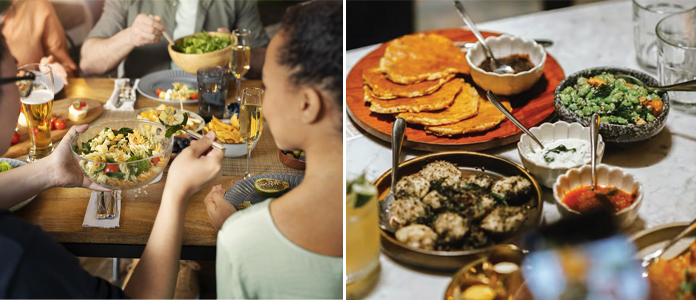 Certain subjects can lead to strained conversations: money, politics, who invented Fish ‘n’ Chips and, of course, death. For Singaporean Tan Ming Li, death was a “taboo topic” she grew up with. However, personal loss has shaped her path to try to demystify death and foster open conversations about grief.
Certain subjects can lead to strained conversations: money, politics, who invented Fish ‘n’ Chips and, of course, death. For Singaporean Tan Ming Li, death was a “taboo topic” she grew up with. However, personal loss has shaped her path to try to demystify death and foster open conversations about grief.
Through her social venture, The Life Review, Ming Li hosts Death Over Dinner, a unique event where people gather together to discuss their experiences of loss over a meal. Through doing so they form a burgeoning community who are striving for connection and striving to find a more compassionate approach to life and death.

When did you first experience loss through death?
My mother passed away from cancer when I was 17. She was undergoing radiotherapy and Dad said, “Don’t worry, she will recover.” It was conveyed to me as “It’s okay, Mum is going to be fine,” so I didn’t think much about it. Within a week, she was gone. After her funeral, I returned to school and nobody knew what had happened. My family didn’t talk about it. I had no understanding of my emotions and no idea how to handle my grief.
How did this shape your understanding of grief?
In the years that followed, other family members passed away, including my father. Each time, I went through the ceremonies and rituals that accompany death because that’s what I was told to do as a kid, but there was no processing or talking about how I was feeling. Seeking help or talking to a counseller in Singapore was not an option back then.
Why was this?
It was – and still is – a taboo subject, especially for the Chinese community. Older generations will say, “If I think about death, it will come to my door.” I started to question this. I think this attitude comes from the fear of the unknown; if I don’t talk about it, I won’t have to face it.
What led you to delve deeper?
I’ve always been interested in social work. During my university years, I volunteered to support children with special needs. I also taught yoga and breathing at institutions such as the Society for the Physically Disabled (SPD) and the Institute of Mental Health (IMH). In my 20s, I moved from Singapore to work in Thailand for a social enterprise. Here I saw how other cultures dealt with death, and I realised the experience could perhaps be handled differently.

How did you integrate your realisation into your work?
When I returned to Singapore, I had the opportunity to support some mothers who’d lost children through miscarriage, suicide, and natural causes. These women were so strong, but also acknowledged their need for self-care. One mother who had chronic back pain concluded that it was due to not allowing herself to grieve. Another lady had insomnia, which turned out to be grief. I grew increasingly curious about how to better support them.
How did you become a death doula?
At the end of 2022, I looked further into bereavement and discovered the work of a death doula. I found a course at the International End of Life Doula Association, New York, and signed up. It took me into a whole new world of pre-death preparation, discussing legacies, patient support, and grief support for those left behind. After the doula course I joined a Master of Science degree in Thanatology, which is the study of all that is “end of life” and non-medical – the psychological, spiritual, and cultural aspects of death.
Tell us about The Life Review …
We launched in 2023 as a non-profit, non-religious organisation. We focus on education, reflection, and discussion around death, using films, arts, and poetry to bring this subject to the forefront. Death Over Dinner is in fact a global movement that originated in the US in 2013, but I tailored the Singapore version to have a focus on food. Some of our dinners are called Death Over Dim Sum.

How does it work?
Death Over Dinner invites strangers to come together to learn, talk, and receive comfort and support on the subject of death. The last event took place at the South Indian restaurant Podi & Poriyal. Participants were served dishes containing ingredients with a special life and death significance in South Indian culture, such as black sesame seeds, which signify purification, and jackfruit, the wood of which is often used as funeral pyre logs during cremation.
Who comes along?
We have 20-30 participants of different ages and backgrounds. Death Over Dinner is available for everyone, but especially the “sandwich generation” aged between 45-60 who have children and elderly parents to care for.
What do participants experience during these dinners?
I try to lead by example, sharing my experience of the death of my mother. While not compulsory, I ask people to bring an item with them to start their personal story – a photo, something belonging to a pet, or a child, or a rosary. I want everyone to have conversations about death and to learn the importance of expressing emotions now, such as “I miss you” or “I love you.” Some people cry, but it’s not like everyone is sobbing and traumatised. The dinner is more about releasing emotions and being allowed to connect in a safe space.
Can you share more of The Life Review’s initiatives?
The End of Life Literacy Programme is for non-professional caregivers of loved ones with long-term illnesses like dementia, cancer, or kidney dialysis. We’re working to bring this programme to as many caregivers as possible. We support the LGBTQ community, who may find it difficult to grieve openly, and we also focus on men who are less likely to show emotion. In addition, we’re devising a programme to help children better understand death. I hope that in five years, Singapore will have a more holistic approach to death, dying and bereavement through music and the arts.
How do you feel looking back on yourself as a 17 year old?
Facing death as a teenager was painful and awful, but creating The Life Review is a silver lining. This is a legacy for my parents. Usually, Chinese children give their parents money, but I cannot do that. This is my way of giving back to the mother and father I lost.
What’s your hope for the future?
That those in grief and pain can receive help without shame or fear of judgment. I want people to know that support is available. The more people I can encourage to join us, the better.
What has learning about death taught you about life?
It was only later in life that I discovered the grief I experienced as a child was affecting me in ways as an adult, such as the way I interacted with people in relationships and friendships. Ultimately, my work around death has taught me to be more intentional about living, to love deeply, and to leave a legacy of compassion and connection.
The next Death Over Dim Sum events take place on 28 Sept & 26 Oct.
thelifereview.org
the.lifereview
SG’s Quirky Collectives
More alternative community groups

- Fix Its!
The idea behind Repair Kopitiam gatherings is to teach people how to mend broken appliances. There are currently 3,000 coaches and volunteers in the community.
repairkopitiam.sg

- Geeks!
This community welcomes those who love all things pop culture, comics, toys, movies, and games. They pride themselves on being a safe place for geeks who want to share in hangouts, comic shops, or at geeky conventions.
geeksmeetupsg

- Acrobats!
Circus of Altrades train at basketball courts, void decks or playgrounds and hope to create opportunities for local artistes.
altrades_sg








